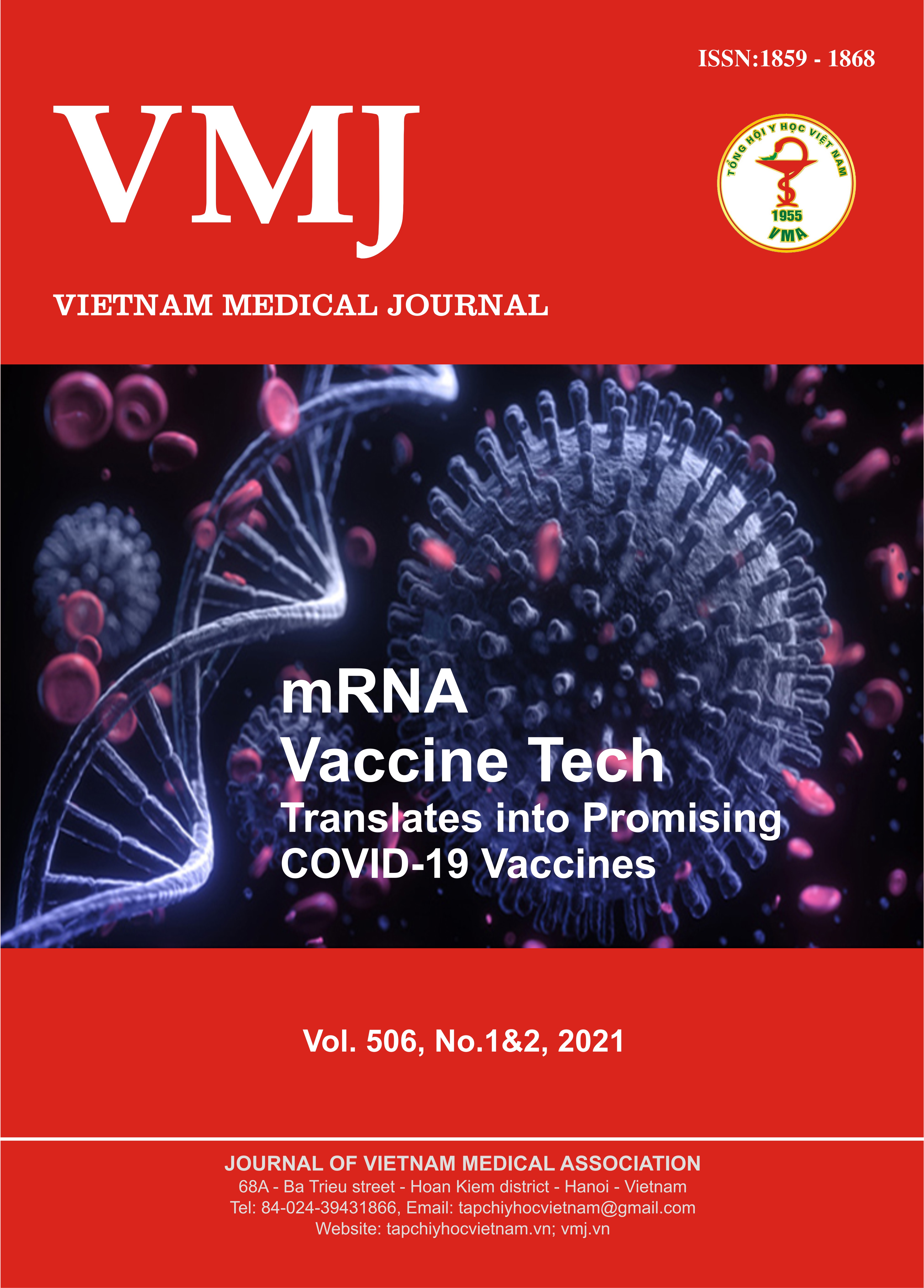SAFETY AND EFFICACY OF STEM CELL THERAPY FOR TREATMENT SEVERE TRAUMATIC BRAIN INJURY
Nội dung chính của bài viết
Tóm tắt
Traumatic brain injury (TBI) is a complicated topic.TBI has expensive treatment, sequelae, high mortality and efficient therapeutic strategies for TBI are urgently needed. Patients with severe TBI account for 10% of all traumatic brain injury patients, but more than 80% of patients who die from traumatic brain injury are in this group of patients. That proves the danger of severe TBI. Mesenchymal stem cells (MSCs) are multipotent cells with high proliferative and self-renewal capacities, as well as immunomodulatory and neuroregenerative effects. MSCshave been shown to treat TBI and significantly reduce inflammation of injured tissue. In the present study, we evaluated the quality and effectiveness of mesenchymal stem cell transplantation with the graft dose of 9x106cells/kg. Clinical indexes (Pulse, temperature, SBP, HATTr, HATTB, GCS) and subclinical (Hepatic index, kidney, cortisol, lactate, glucose, hematological index, respiratory index) were monitored on 60 patients within 6 months.
The results showed that the recovery journey is different for every person with the graft dose of 6-9x106 cells/kg, but there were no adverse complications for the patients, the clinical and paraclinical indicators were stable. No significant side effects were observed during the trial as well as after 6 months of treatment. The MSC transfusions significantly increased the life quality patients; reduced brain damage and increased HSC counts. Inflammatory cytokines (IL-6) levels decreased and GCS increased in the MSC transfusion group, indicating that the patient's health improved.
Chi tiết bài viết
Từ khóa
Traumatic brain injury, mesenchymal stem cell, mononuclear cells, transplantation, neuroimmunity, anti-inflammation
Tài liệu tham khảo
2. Von Leden R.E., Yauger Y.J., Khayrullina G., Byrnes K.R. Central nervous system injury and nicotinamide adenine dinucleotide phosphate oxidase: oxidative stress and therapeutic targets. J. Neurotrauma. 2017;34:755-764.
3. Sanchez-Ramos J., Song S., Cardozo-Pelaez F., et al. Adult bone marrow stromal cells differentiate into neural cells in vitro. Experimental Neurology. 2000;164:247-256. doi: 10.1006/exnr.2000.7389.
4. Borlongan CV. Bone marrow stem cell mobilization in stroke: a ‘bonehead’ may be good after all! Leukemia. 2011;25: 1674-1686
5. Walker PA, Shah SK, Harting MT, Cox CS. Progenitor cell therapies for traumatic brain injury: barriers and opportunities in translation. Dis Model Mech. 2009;2:23-38.10.1242/dmm.001198.
6. Tian C, Wang X, Wang X, Wang L, Wang X, Wu S, Wan Z. Autologous bone marrow mesenchymal stem cell therapy in the subacute stage of traumatic brain injury by lumbar puncture. Exp Clin Transplant. 2013 Apr 1;11(2):176-81.
7. Cox Jr CS, Hetz RA, Liao GP, Aertker BM, Ewing‐Cobbs L, Juranek J, Savitz SI, Jackson ML, Romanowska‐Pawliczek AM, Triolo F, Dash PK. Treatment of severe adult traumatic brain injury using bone marrow mononuclear cells. Stem Cells. 2017 Apr;35(4):1065-79.
8. Mehta R, Chinthapalli K. Glasgow coma scale explained. BMJ. 2019 May 2;365.
9. Baron F, Storb R. Mesenchymal stromal cells: a new tool against graft-versus-host disease?. Biology of Blood and Marrow Transplantation. 2012 Jun 1;18(6):822-40.
10. Guo J, Huang Z, Lin L, Lv J. Coronavirus disease 2019 (COVID-19) and cardiovascular disease: a viewpoint on the potential influence of angiotensin-converting enzyme inhibitors/angiotensin receptor blockers on onset and severity of severe acute respiratory syndrome coronavirus 2 infection. Journal of the American Heart Association. 2020 Apr 9;9(7):e016219.
11. Vaibhav K, Braun M, Alverson K, Khodadadi H, Kutiyanawalla A, Ward A, Banerjee C, Sparks T, Malik A, Rashid MH, Khan MB. Neutrophil extracellular traps exacerbate neurological deficits after traumatic brain injury. Science advances. 2020 May 1;6(22):eaax8847.
12. Hashmi S, Ahmed M, Murad MH, Litzow MR, Adams RH, Ball LM, Prasad VK, Kebriaei P, Ringden O. Survival after mesenchymal stromal cell therapy in steroid-refractory acute graft-versus-host disease: systematic review and meta-analysis. The Lancet Haematology. 2016 Jan 1;3(1):e45-52.
13. Kamen DL, Nietert PJ, Wang H, Duke T, Cloud C, Robinson A, Gilkeson GS. CT-04 Safety and efficacy of allogeneic umbilical cord-derived mesenchymal stem cells (MSCs) in patients with systemic lupus erythematosus: results of an open-label phase I study.
14. Cox Jr CS, Baumgartner JE, Harting MT, Worth LL, Walker PA, Shah SK, Ewing-Cobbs L, Hasan KM, Day MC, Lee D, Jimenez F. Autologous bone marrow mononuclear cell therapy for severe traumatic brain injury in children. Neurosurgery. 2011 Mar 1;68(3):588-600.
15. Clark RS, Schiding JK, Kaczorowski SL, Marion DW, Kochanek PM. Neutrophil accumulation after traumatic brain injury in rats: comparison of weight drop and controlled cortical impact models. Journal of neurotrauma. 1994 Oct;11(5):499-506.
16. Venetsanou K, Vlachos K, Moles A, Fragakis G, Fildissis G, Baltopoulos G. Hypolipoproteinemia and hyperinflammatory cytokines in serum of severe and moderate traumatic brain injury (TBI) patients. European cytokine network. 2007 Oct 26;18(4):39-42.
17. Chang YS, Ahn SY, Yoo HS, Sung SI, Choi SJ, Oh WI, Park WS. Mesenchymal stem cells for bronchopulmonary dysplasia: phase 1 dose-escalation clinical trial. The Journal of pediatrics. 2014 May 1;164(5):966-72.


